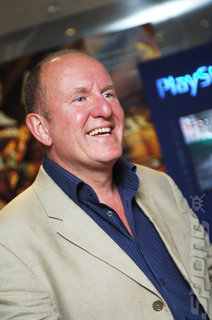I remember the negativity from some in the room, the supposition that nothing would change and the work would be a waste of time. Despite that cynicism, the overwhelming mood was one of ‘right let’s get to work and get things changed’.
The project was huge and involved hundreds of stakeholders and interested parties. Ian and Alex led from the front and we saw true collaboration between two industries that had barely doffed their hats to each other previously.
Then, one evening late in January 2011, a few of us gathered in a room at NESTA to go through the final touches; we also needed to get a few naysayers to finally put their name to the review.
Fortunately, despite some brinkmanship on the part of this one party, we got the report closed and off to the printers. Three days later we all assembled in a cinema in the West End of London and saw Alex, Ian and Ed tell the assembled gathering of the great and good from films and video games what was going to change.
The report made twenty key recommendations and top of the list was ‘Bring computer science into the National Curriculum as an essential discipline’.
Challenge Writ Large
So, that was the first challenge writ large. So far, so good. We had delivered a great piece of work, we had the support of the Minister and his department (DCMS) and we had worked with another industry together proving 1+1>2. But we had never actually gained the mindshare of the key Government department, for example, the Department for Education (DfE).
Michael Gove MP runs that department and worrying noises were coming out of it about ‘getting back to basics’ and re-introducing Latin on to the National Curriculum, dispensing with Art and generally cutting down the breadth of choice. This was a major fault line running right down the middle of our campaign and we needed to fix that.
Most, if not all politicians who Ian and I met always got confused between ICT and Computing. Famously I had 10 minutes one-to-one with The Prime Minister in March of last year. He asked me for the one thing he could take back to his Government that would help our industry. He was expecting ‘tax breaks’, which I did talk about, but I highlighted the Next Gen Skills work and explained the difference between coding and ICT.
Taking a leaf out of his book, I explained that the not allowing our children under the hood of software but instead just teaching them how to use utilities like Powerpoint, Excel and Word was not only boring for them, but actually did not teach them the ability to create.
ICT was like learning to read, and Computing was like learning to write. One is simply consumption and one is creation. Indeed Latin, I argued was the Lingua Franca of the previous two Millennia, but code was the Lingua Franca of the current Millennium.
If the UK was to stand tall and lead in a technology world, its citizens needed to be equipped with the right skills. English, Maths, Science, Art and Computer Science were essential. We really did have an education project in more ways than one on our plate.
Upping Our Game
To this end, Ian and I decided to step up our game from the games industry perspective. It was clear that the skills we had called for were not unique to games and VFX. They were fully transferable across other industries.
It was essential for us to build a broad coalition of like-minded bodies and companies to make the need clear and urgent to the DfE and wider government. Indeed, in our first Next Gen Skills campaign meeting, we were told two things:
Firstly, that Computer Science was never going to be considered as part of the National Curriculum review.
Secondly, that any change would not be in the lifetime of this Parliament and would take a minimum of five years to see any kind of action.
This was like red rag to a bull for me and Ian. We simply were not going to accept that we could not change things – or that if we could that the rate of any positive change would be so slow. We all felt this was a national emergency and action was needed far quicker than this.
The coalition of supporters needed galvanising and it needed strong leadership. It was with that in mind that The Association for Interactive Entertainment (UKIE) agreed to fund the Next Gen campaign and is still doing this today.
Next Gen is supported by Skillset, Google, Facebook, Guardian Media Group, Nintendo, Sony Computer Entertainment, Intellect, BCS Computing Academy, Blitz Games, BSAC, Double Negative, Talk Talk and Double Negative amongst others… and it is growing.
Massive Win
The rest is sort of history. The DfE has fully engaged with the Next Gen campaign and is now completely aligned with both DCMS and BIS (Department for Business Innovation and Skills). There is a general buzz now around the video games industry that we are being taken seriously. We are a proper industry and we can work with other industries to forge wealth for the nation and provide vital jobs for our young people.
Indeed at the recent BETT show in London, Michael Gove said that ICT was going to be ditched in September.
The project was huge and involved hundreds of stakeholders and interested parties. Ian and Alex led from the front and we saw true collaboration between two industries that had barely doffed their hats to each other previously.
Then, one evening late in January 2011, a few of us gathered in a room at NESTA to go through the final touches; we also needed to get a few naysayers to finally put their name to the review.
Fortunately, despite some brinkmanship on the part of this one party, we got the report closed and off to the printers. Three days later we all assembled in a cinema in the West End of London and saw Alex, Ian and Ed tell the assembled gathering of the great and good from films and video games what was going to change.
The report made twenty key recommendations and top of the list was ‘Bring computer science into the National Curriculum as an essential discipline’.
Challenge Writ Large
So, that was the first challenge writ large. So far, so good. We had delivered a great piece of work, we had the support of the Minister and his department (DCMS) and we had worked with another industry together proving 1+1>2. But we had never actually gained the mindshare of the key Government department, for example, the Department for Education (DfE).
Michael Gove MP runs that department and worrying noises were coming out of it about ‘getting back to basics’ and re-introducing Latin on to the National Curriculum, dispensing with Art and generally cutting down the breadth of choice. This was a major fault line running right down the middle of our campaign and we needed to fix that.
Most, if not all politicians who Ian and I met always got confused between ICT and Computing. Famously I had 10 minutes one-to-one with The Prime Minister in March of last year. He asked me for the one thing he could take back to his Government that would help our industry. He was expecting ‘tax breaks’, which I did talk about, but I highlighted the Next Gen Skills work and explained the difference between coding and ICT.
Taking a leaf out of his book, I explained that the not allowing our children under the hood of software but instead just teaching them how to use utilities like Powerpoint, Excel and Word was not only boring for them, but actually did not teach them the ability to create.
ICT was like learning to read, and Computing was like learning to write. One is simply consumption and one is creation. Indeed Latin, I argued was the Lingua Franca of the previous two Millennia, but code was the Lingua Franca of the current Millennium.
If the UK was to stand tall and lead in a technology world, its citizens needed to be equipped with the right skills. English, Maths, Science, Art and Computer Science were essential. We really did have an education project in more ways than one on our plate.
Upping Our Game
To this end, Ian and I decided to step up our game from the games industry perspective. It was clear that the skills we had called for were not unique to games and VFX. They were fully transferable across other industries.
It was essential for us to build a broad coalition of like-minded bodies and companies to make the need clear and urgent to the DfE and wider government. Indeed, in our first Next Gen Skills campaign meeting, we were told two things:
Firstly, that Computer Science was never going to be considered as part of the National Curriculum review.
Secondly, that any change would not be in the lifetime of this Parliament and would take a minimum of five years to see any kind of action.
This was like red rag to a bull for me and Ian. We simply were not going to accept that we could not change things – or that if we could that the rate of any positive change would be so slow. We all felt this was a national emergency and action was needed far quicker than this.
The coalition of supporters needed galvanising and it needed strong leadership. It was with that in mind that The Association for Interactive Entertainment (UKIE) agreed to fund the Next Gen campaign and is still doing this today.
Next Gen is supported by Skillset, Google, Facebook, Guardian Media Group, Nintendo, Sony Computer Entertainment, Intellect, BCS Computing Academy, Blitz Games, BSAC, Double Negative, Talk Talk and Double Negative amongst others… and it is growing.
Massive Win
The rest is sort of history. The DfE has fully engaged with the Next Gen campaign and is now completely aligned with both DCMS and BIS (Department for Business Innovation and Skills). There is a general buzz now around the video games industry that we are being taken seriously. We are a proper industry and we can work with other industries to forge wealth for the nation and provide vital jobs for our young people.
Indeed at the recent BETT show in London, Michael Gove said that ICT was going to be ditched in September.


